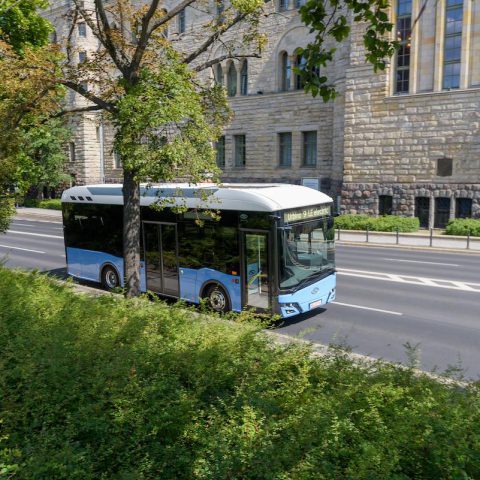106 Solaris zero emission buses headed to ÖBB Postbus’ fleet in Austria
Up to 106 zero emission buses are headed to Austria, where ÖBB Postbus is going to deploy them starting from 2022 – 2025. Solaris has signed another framework agreement with the Austrian bus company Österreichische Postbus AG. It stipulates a possibility to deliver up to 106 battery-electric and hydrogen buses that would be deployed throughout Austria. The models offered include Urbino 9 LE electric and Urbino 12 […]

Up to 106 zero emission buses are headed to Austria, where ÖBB Postbus is going to deploy them starting from 2022 – 2025.
Solaris has signed another framework agreement with the Austrian bus company Österreichische Postbus AG. It stipulates a possibility to deliver up to 106 battery-electric and hydrogen buses that would be deployed throughout Austria. The models offered include Urbino 9 LE electric and Urbino 12 hydrogen buses. The agreement envisages deliveries in the years 2022-2025. It’s the bus builder itself to point this out in a press note.
Up to 106 zero emission buses for ÖBB Postbus
In February this year, Solaris and Österreichische Postbus AG, the largest bus company in Austria and a leader in regional public bus transport, concluded a framework agreement for the delivery of up to 106 state-of-the-art and environmentally friendly buses. Possible orders are to be fulfilled in the years 2022-2025 with an option to prolong this period until 2028. Buses to be purchased by the client include up to 24 of the latest, zero-emission Urbino 9 LE electric buses, and up to 82 Urbino 12 hydrogen buses.
The framework agreement is yet another agreement for hydrogen buses concluded between Österreichische Postbus AG und Solaris. The previous contract signed in February 2021 assumed, among other things, the delivery of up to 40 Solaris Urbino 12 hydrogen buses.
Solaris Urbino 9 LE Electric to be offered
The contract also provides for the possibility to purchase Urbino 9 LE electric buses, the youngest member of the electric Solaris family, which was launched in September 2021. This model has been designed in such a way that it can be adapted for class I or class II type approval. Thus, the bus provides a link between the urban and suburban road networks. These 9-metre buses will be equipped with a central electric motor. The propulsion system will be powered by energy derived from a set of Solaris High Energy batteries with a total capacity of about 280 kWh, and the spacious interior will take at least 65 passengers. The modernised design in the rear of the bus provides more headroom, which will enhance the quality of the journey.







